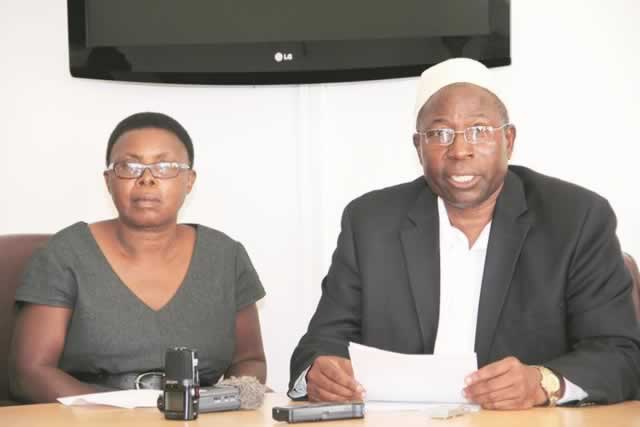Make sanitary pads free

Roselyne Sachiti Features Editor
BEN Gambiza is a 44-year- old single father staying in Epworth, just outside Zimbabwe’s capital, Harare.
He has three children, two boys and one girl.
The girl, Sarah, was only six when Gambiza’s wife died in 2008.
They would talk about anything, how she spent her day at school, bullying, unpaid school fees and how they would cope with food challenges in the home.
But, a single event that happened while she was at school changed everything.
Sarah had seen some blood on her panties during a toilet break at school and told her friend.
“My friend said I cannot tell my father. Her mother had told her that menstruation cannot be discussed with men. Our teacher is a man so I could also not tell him and sat in the toilet until break-time.
“My friend told me to put tissue paper on the pant. I went home and continued using tissue paper for the first cycle and the next then the other. I developed a rash and still told no one,” she said.
Sarah, now 13 years, has no close female relatives to confide in. She does not want to tell their female neighbours. She fears they will gossip about her. All her aunts work on farms in Chinhoyi.
“At school I saw my friends with cotton wool and sanitary pads in their bags. They told me they used them when menstruating. They also told me the cheapest packet of pads cost $1 while cotton also costs 90 cents.
“I cannot afford any of the two. I cannot ask for money from my father. My friend said I would bleed forever if my father knew I would be menstruating. She also said I cannot cook meat when I am menstruating,” she said.
Sarah is not alone. Many girls face challenges in accessing clean sanitary wear during their menses.
What makes their situation worse is the menstruation is regarded taboo in many societies.
Sanitary wear issues are also not taken seriously by society yet they are important to women’s reproductive health.
Today (May 28) is Menstrual Hygiene Day, a day set aside to help to break the silence and build awareness about the fundamental role that good menstrual hygiene management plays in enabling women and girls to reach their full potential.
It is also a global platform for partners across all sectors to engage in action, advocacy and knowledge-sharing around menstrual hygiene management.
Women Action Group Executive Director Mrs Edinah Masiyiwa said the major challenge facing Zimbabwean women is the cost of sanitary wear.
“Cotton wool which is supposed to be the cheapest is not even accessible. Pads cost US$1 but some communities cannot find a dollar to buy a packet,” she said.
Mrs Masiyiwa said the women’s movement is proposing a programme that makes sanitary pads free and easily accessible to all women.
She said while recyclable pads made of cloth can be a stop gap measure, they may not be as hygienic because of the taboos that come with menstruation.
“Recycled pads can cause problems. Because of issues that make menstruation taboo in some societies, some women will not dry the cloth under proper unsanitary conditions which will result in the cloth remaining most as they try to hide it. Also, cloth can result in a friction on cause bruising on the women’s private parts. We are looking at hygiene issues,” she said.
However, Mrs Masiyiwa added, Zimbabwe has gone a long way in discussing issues of taboo when it comes to menstruation issues.
She said the debate started in Parliament a few years back and her hope is it continues.
“The debate should continue even in rural areas. I am happy to have come across some fathers who are very keen to support daughters in menstrual issues by providing money for pads, “she said.
An assessment by local NGO Integrated Sustainable Livelihoods showed that 70 percent of girls in Form One and Two failed to go to school during their monthly period because they do not use proper sanitary wear.
As such Integrated Sustainable Livelihoods has trained thousands of women, girls and men in rural areas like Mhondoro Ngezi, Mudzi, Nyabira and Battlefield in Munyati on how to make re-usable sanitary pads.
At least there has been change in those areas.
A local company, Kutsi pads, has also been manufacturing re-usable pads for resale in Zimbabwe, supplying mostly Non-Governmental organisations.
However, the reusable pads are not visible in supermarkets meaning some women who want to access them cannot.
Before the intervention of reusable pads, girls would use newspapers, tissues, rags and even cow dung as sanitary pads.
The challenge is not unique to Zimbabwe.
Worldwide, millions of women and girls have no information before starting menstruation and no sanitary product, clean toilet or clean water to allow them to cope with their periods.
In East Africa, one in two girls missed school every month due to menstruation, contributing to the gender gap.
The topic is taboo and shrouded in myths that menstruating girls are dirty and can contaminate others.
In their newsletter Irise International said lack of support for Menstrual Hygiene Management was a barrier to girls’ empowerment through an insidious impact on their ability to engage in education and make good decisions about their reproductive health.
Irise International, an organisation run by young professionals in Uganda and the UK, was founded in 2012 in response to the concerns of East African schoolgirls about the impact menstruation was having on their lives.
Their survey of 1 906 girls across the Great Lakes Region suggested that issues around MHM are widespread:
About 50 percent of girls reported missing school because of menstruation in that region.
A total of 68 percent girls used cloths/rags some or all of the time while 52 percent believed menstrual pain is a sign of illness.
In India, an organisation, GOONJ, carried out research and found that in the absence of a clean cloth, women used the dirtiest rags.
Because of the scarcity and lack of access to cloth, this rag may be shared among family members and some women will use the same cloth for up to a year.
They also found that a lack of appropriate or adequate sanitation facilities prevents girls from attending school while they are menstruating.
“Some women are reluctant to wash and dry their cloth rags in public. The cloth rag remain moist and encourages bacterial growth and subsequent infection,” the research pointed out.
With such challenges, there is need to create a world in which every woman and girl can manage her menstruation in a hygienic way – wherever she is – in privacy, safety and with dignity.
In short, governments should start by heavily subsidising sanitary wear and make it accessible in schools.
It should be free for all women who cannot afford.
Feedback: [email protected] or [email protected]









Comments